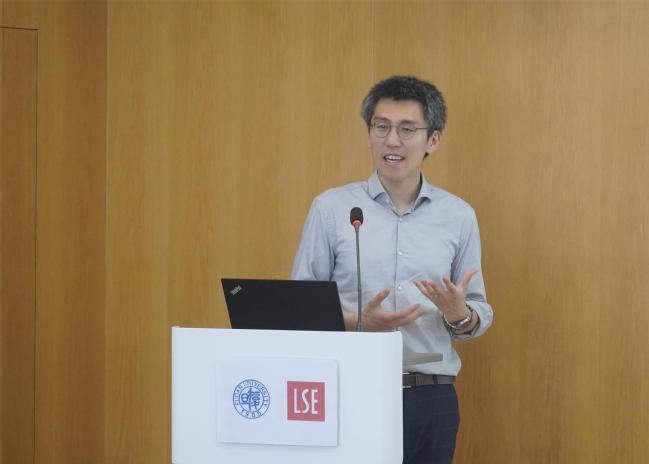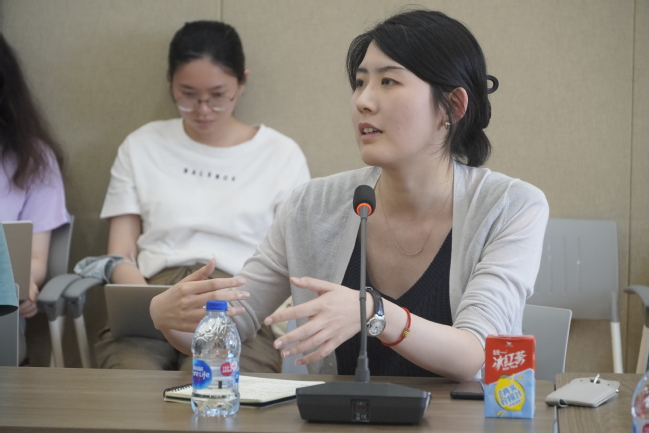Events



On June 15th, 2023, the 7th Young Scholar Workshop was held in the conference room on the 8th floor of the West Sub-Building of Guanghua Towers. Assistant Professor Yixian Sun from Bath University gave a presentation on “China’s Engagement with Sustainability Governance in Global Supply Chains”. The workshop was hosted by Assistant Professor Haoqi Qian from the Institute for Global Public Policy (IGPP), Fudan University. Assistant Professor Jingyuan Xu and Assistant Professor Yunxiong Li from IGPP served as discussants.
At the beginning of the lecture, Dr. Qian gave a brief introduction of Dr. Sun. Yixian Sun is an assistant professor in international development at the University of Bath. His research focuses on environmental politics, sustainable development, and transnational governance, showing the changing role of emerging economies in global sustainability governance. He is the author of Certifying China (MIT Press, 2022) and has published work in high-impact journals, including Global Environmental Change, Nature Food, Nature Sustainability, and Review of International Political Economy. He serves as associate editor of Global Environmental Politics and World Development Perspectives and member of the Expert Peer Review Group of the UN-backed Race to Zero Campaign.

In the first part of the presentation, Dr. Sun provided an overview of the introduction and development of transnational supply chain governance in China around his book Certifying China. He pointed out that transnational supply chain governance (e.g., eco-certification) provides a commitment to sustainable market transformation, such as voluntary governance rules rather than being subject to a country's sovereign regulations, the participation of multiple stakeholders in rule-making, and a focus on regulations. However, there is a significant discrepancy in the acceptance of ecological certification products between the global North and South. Based on this background, Dr. Sun explored the following research question: what economic and political force can drive the entry and development of transnational eco-certification in China. Using a political economy approach, Dr. Sun introduced the mechanisms of interaction between domestic stakeholders into the framework of transnational governance. He believes that transnational governance operates between the market and politics and is based on the institutionalized governance process of the host country in the practice process. Through the case of ecological certification in China's palm oil, seafood, and tea industries, Dr. Sun Yixian provided empirical support for the theoretical mechanism of the introduction and development of ecological certification in China.

Next, Dr. Sun further explored the potential for the rise of China-led global supply chain governance. He noted that over the past decade, the Chinese government has increasingly focused on the impacts of overseas activities of Chinese actors on sustainable devleopment. Since 2021, China has been encouraging companies to adopt higher international or domestic standards to manage environmental risks. Taking the Responsible Cobalt Initiative proposed by China as an example, Dr. Sun argued that China has the potential to transform from a follower of rules to a maker of rules. On the one hand, sustainable development standards and norms developed by China may play a key role in promoting the Green Belt and Road Initiative; on the other hand, when developing new standards and norms, Chinese actors can learn international rules while also demonstating willingness to promote new norms.

After the presentation, Dr. Jingyuan Xu and Dr. Yunxiong Li gave their comments and exchanged views with Dr. Sun. Dr. Xu discussed policy analysis theory and local government actions, and further exchanged ideas with Dr. Sun on whether similar models exist in other emerging economies except China. Dr. Li commented that the Western model of eco-certification development follows a bottom-up approach and the media plays an important role, while the Chinese model of eco-certification may follow a top-down approach driven by the government. In addition, Dr. Li discussed with Dr. Sun on the definition of transnational governance of supply chains, geopolitics, and economic geography. In the end, the Young Scholars’ workshop was successfully concluded with a warm applause from the audience.
